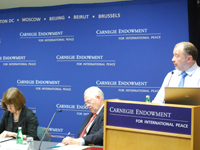Carnegie Endowment: The Tandem Government And Decision-Making In Russia
|
posted by eagle on October, 2010 as ANALYSIS / OPINION
The Tandem Government and Decision-Making in RussiaMaria Lipman, Nikolay Petrov, James F. Collins19/10/2010 – WASHINGTON, D.C.

Carnegie’s Maria Lipman and Nikolay Petrov discussed ongoing developments in Russian politics and the future of the Medvedev-Putin "tandem.” Carnegie’s Ambassador James F. Collins moderated.
Political DevelopmentsPetrov outlined several recent developments in Russian politics: - Replacements: Following the move away from popularly elected regional governors, and what appears to be a similar trend in the selection of mayors, the government has replaced several political heavyweights in recent months. The most prominent of these was Moscow Mayor Yury Luzhkov, who was fired in September by President Medvedev. The new appointees for these key federal positions often have fewer regional ties than their predecessors, Petrov added.
- Elections: Developments in the area of elections have been mixed. On the one hand, Russia’s political system is characterized by a lack of political competition and the trend toward Moscow-appointed mayors is clearly a negative one. On the other hand, there have been some positive trends, such as increased competition within the United Russia party itself, which began holding primaries in 2007.
- United Russia: United Russia is losing votes and has exhausted the methods available to it to increase popular support. The party will need to adjust to the changing political landscape or risk losing more votes, Petrov explained.
Major ChallengesPetrov discussed some of the challenges currently facing Russia and the tandem government, including: - Caucasus: The Kremlin’s current approach to the Caucasus is unsustainable. The country is focusing on a short-term, quick-fix strategy to stabilize the northern Caucasus and prepare for the 2014 Olympic Games rather than a long-term national approach that could yield sustainable stability and development in the region.
- Lack of Innovation: Russia is suffering from technological fatigue in various spheres, Petrov said, pointing to lags in scientific innovation, education, and healthcare. A string of recent events, including last year’s explosion as Sayano-Shushenskaya power plant, spotlight Russia’s aging infrastructure.
- Inefficiency: The country suffers from an inefficient system of governance characterized by a lack of checks and balances on major interests, including regional interests.
Possible Scenarios for 2012- Putin for president: It is possible that Putin will run for president in 2012, Petrov said, and this may be a positive development. Currently, the discrepancy between Putin’s "real” role as de facto leader and his formal role as second in command makes it impossible for him to promote much-needed political modernization.
- "Triumvirate” Arrangement: Another possibility in 2012 is a triumvirate arrangement with Putin as the strategic leader (Duma speaker), Medvedev as the formal leader (president), and a third individual as the tactical leader (Premier).
- Status Quo: The preservation of the status quo is the least attractive scenario, because political and social progress has already proven difficult under this model.
In the Public EyeA number of issues have recently attracted public and media attention in Russia, Lipman noted. - Wildfires: The coverage of this summer’s wildfires was characterized by a clear divide between state and independent media coverage. State media acknowledged the wildfires but focused heavily on the actions of Putin and Medvedev. In contrast, the independent media highlighted the government’s inadequacy in responding to the disaster. However, it is worth noting that despite the independent media’s unfavorable coverage and forecasts by political analysts that the wildfires would damage the public’s perception of the government, Putin’s approval ratings remained largely stable throughout the crisis.
- Police Lawlessness: After a string of police abuse cases in recent months, Putin has launched a police reform effort, but its potential for success is questionable at best because the police are entrusted with implementing the reform themselves, Lipman said. She explained that these abuses reflect a broader problem of an absence of an accountability system and the lack of an independent judiciary in Russia. Petrov added that abuses of power by the police are a result of the current system of government management, and cannot truly be addressed in isolation, without a concurrent wide-ranging government reform.
- Replacement of Moscow Mayor Luzhkov: The recent standoff between Luzhkov and the government was unusual in several ways, Lipman said. First, the conflict was not between the Kremlin and an opposition party, since Luzhkov is a member of United Russia, and yet the government used the same tactics against Luzhkov that it has employed in the past against political opponents, including damaging coverage on state television. Second, Lipman described the replacement of Luzhkov as a blow to the established system, in which elites are expected to publicly agree with the leadership and blatant dissent is uncommon.
- Khimki Forest: The government’s decision to halt plans for highway development in the Khimki Forest was not due solely to public outcry and civil society mobilization, Lipman said. It was also a business decision in response to a loss of backing by foreign funders, including banks, which pulled out of the project following widespread criticism in Russia and at home.
comments (0)
|






















